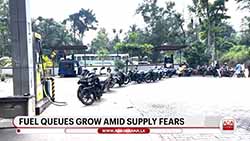Sri Lanka to buy stake in Google’s Project Loon
February 2, 2016 11:04 am
Sri Lanka’s government announced Monday it would take a 25 per cent stake in a joint venture with Google designed to deliver a high-speed Internet service powered by balloons and that tests would begin this month.
Telecommunications Minister Harin Fernando said Google has taken delivery in Sri Lanka of the giant helium-filled balloons and other equipment needed to carry out tests across the island.
“The tests will start later this month at Ratmalana (a suburb of the capital Colombo) and could last up to a year,” Fernando told reporters.
“The government of Sri Lanka will have a 25 per cent stake in the (joint-venture) company in return for the spectrum that will be allocated for the project,” the minister added in Colombo.
Fernando said there would be no other capital investment by Sri Lanka, but 10 per cent of the joint venture would be offered to existing telephone service providers in the island.
The minister said most of the Internet service providers on the island were in favour of what is known as Google’s “Project Loon” that will extend their coverage and offer cheaper rates for data services.
“Our objective is to extend coverage so that the entire island will be covered,” Fernando said. “With competition, tariffs will also come down.”
Service providers will be able to access higher speeds and improve the quality of their existing service once the balloon project is up and running.
The balloons, once in the stratosphere, will be twice as high as commercial airliners and barely visible to the naked eye. The balloons will have a lifespan of about 180 days, but can be recycled, said Fernando who visited Google’s testing facility at Silicon Valley.
Official figures show there are 3.3 million mobile Internet connections and 630,000 fixed line Internet subscribers among Sri Lanka’s more than 20 million population.
Sri Lanka became the first country in South Asia to introduce mobile phones in 1989 and the first to roll out a 3G network in 2004. It was also the first in the region to unveil a 4G network two years ago.
Source: AFP











